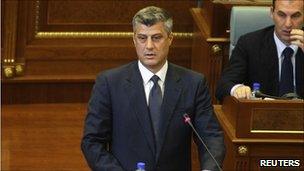Kosovo's government brought down by no-confidence vote
- Published

Prime Minister Hashim Thaci told parliament the vote was an "exit strategy" from the crisis
Kosovo's minority government has been brought down by a vote of no-confidence in parliament.
The fall comes less than three years after Kosovo declared independence from Serbia to become Europe's newest state.
Snap elections will now take place in December.
The motion, which was brought by an opposition party, took place after the governing coalition collapsed when a junior partner withdrew.
Sixty-six MPs voted in favour of it in the 120-seat parliament.
Prime Minister Hashim Thaci said it was Kosovo's "first political and institutional crisis".
However, he added: "This vote is an exit strategy for Kosovo institutions from this crisis." He added: "Your vote is a new beginning for the state of Kosovo."
His PDK party is expected to again emerge with the most votes.
Kosovo entered political deadlock in September when President Fatmir Sejdiu resigned after a court ruled he could not simultaneously be a party leader and the head of state.
His LDK party, which had governed in coalition since independence, quit the government, depriving the PDK of a parliamentary majority.
All of this comes at a crucial moment for Kosovo. Serbia, which rejects Kosovo's unilateral secession, had recently agreed to the first face-to-face talks with the Kosovo government.
But that dialogue, led by the European Union, is now unlikely to start until after the elections.
The BBC's Balkans correspondent, Mark Lowen, says the political crisis will also undoubtedly delay any further recognitions - which Kosovo badly needs.
Just 71 countries have recognised its independence, preventing it from joining international bodies like the United Nations.
- Published15 October 2010
- Published3 October 2010
- Published27 September 2010
- Published10 September 2010
- Published17 August 2010
- Published22 July 2010